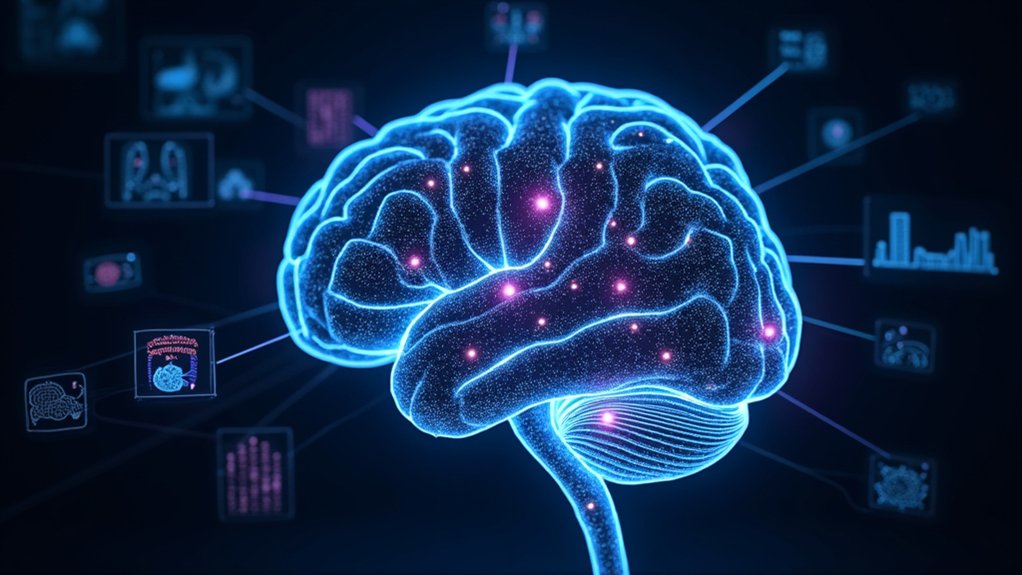Microsoft's AI strategy centers on an $80 billion investment in data centers by 2025. The company integrates AI across its products, including Microsoft 365, Azure, and Teams. Their partnership with OpenAI, which began in 2019, powers many of these capabilities. Microsoft's approach follows six principles focusing on responsible development while generating $13 billion in annual AI revenue. The full scope of their AI transformation extends far beyond these numbers.

While tech companies race to develop artificial intelligence, Microsoft has established itself as a leading force in the AI revolution. The company plans to invest $80 billion in AI-enabled data centers in fiscal year 2025, building on its long-standing partnership with OpenAI that began in 2019. This relationship has proven valuable as Microsoft's Azure AI infrastructure now powers OpenAI's advanced systems.
Microsoft has integrated AI across its product lineup. The Copilot AI assistant now works throughout the Microsoft 365 suite. Businesses can access powerful AI through Azure OpenAI Service. Teams offers AI-driven transcription and translation. Coders get help from GitHub Copilot, while sales teams benefit from AI features in Dynamics 365. Microsoft's commitment to seamless integration of AI extends into their security solutions, creating a comprehensive AI ecosystem.
Microsoft's AI integration brings intelligent assistance to every corner of its ecosystem, transforming how we work and collaborate.
The company follows six human-centered principles for responsible AI development. For over six years, teams across Microsoft have worked on guaranteeing AI systems are fair, reliable, private, inclusive, and transparent. Their Responsible AI Standard guides product development, and their AI for Good programs aim to make this technology more accessible. Microsoft's incremental approach focuses on enhancing existing tools rather than developing entirely new products.
Microsoft's AI work builds on 30+ years of research. The company has helped develop large language models like GPT-4 while continuing to explore new AI capabilities through Microsoft Research. Recent investments include smaller but powerful models like Phi-3. As part of the broader AI industry, Microsoft contributes to the ethical governance frameworks needed to address limitations and responsible development of AI technologies.
For businesses, Microsoft offers a vision of AI in every application and process. Their platform aims to make AI accessible to users of all skill levels, with solutions tailored to specific industries. The strategy focuses on transforming business processes through AI integration.
The company's AI business has shown impressive growth, surpassing $13 billion in annual revenue with 175% year-over-year growth. Microsoft continues to expand through strategic partnerships across industries while engaging with policymakers on AI regulations.
They've established internal governance structures like a Data Council and developed AI training programs for employees to guarantee responsible growth in this rapidly evolving field.
Frequently Asked Questions
How Does Microsoft's AI Compare to Google's AI Offerings?
Microsoft and Google both offer strong AI platforms with different strengths.
Microsoft leverages its OpenAI partnership to integrate tools like Copilot across Office products and Azure services.
Google relies on its homegrown models like Gemini and PaLM 2, with AI enhancing Google Workspace and Android.
While Microsoft emphasizes business applications and developer tools, Google focuses on consumer applications and search enhancements through DeepMind research.
What Privacy Concerns Exist With Microsoft's AI Implementations?
Privacy concerns with Microsoft's AI implementations include unencrypted storage of screen captures in Microsoft Recall and broad data access permissions in Copilot.
Users worry about their content being used for AI training without consent. The inability to completely uninstall Recall raises security issues.
There's also risk of sensitive information being exposed accidentally and vulnerability to cyberattacks due to an expanded attack surface.
Will Microsoft's AI Tools Replace Human Jobs?
Microsoft's AI tools will likely transform jobs rather than completely replace them.
The company's AI systems can automate routine tasks, potentially affecting administrative positions.
However, data shows AI implementations often create new opportunities.
Microsoft itself states its goal is to enhance human capabilities, not replace workers.
As with most technology shifts, some roles will change while new positions requiring AI expertise will emerge.
How Much Does Implementing Microsoft's AI Solutions Typically Cost?
Implementing Microsoft's AI solutions varies in cost based on specific services.
Azure OpenAI Service charges $0.03-$0.06 per 1K tokens for GPT-4 and much less for GPT-3.5.
Azure AI Search starts at $100 monthly for basic tier.
Document Intelligence begins at $0.65 per 1000 pages.
Bot Service offers free standard messaging channels with premium options at $0.50-$1.00 per 1000 messages.
Free tiers exist for limited usage.
Can Small Businesses Benefit From Microsoft's Enterprise AI Technologies?
Small businesses can benefit from Microsoft's enterprise AI tools. Copilot for Microsoft 365 helps with everyday tasks while Power Platform offers simpler AI development options.
Studies show 50% of small firms already use some form of AI. These technologies can automate tasks, improve customer service, and provide data insights.
However, businesses face challenges including training needs, security concerns, and integration costs.









